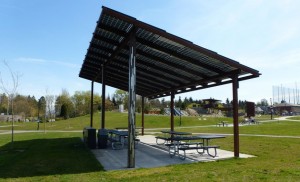
A couple of dozen solar panels sit atop a picnic shelter at a neighborhood park in Seattle.
Credit: Seattle CIty Light
Traditionally, energy systems flowed in one direction: from big power producers to consumers. Now, with more people getting rooftop solar panels, they’re increasingly two-way: homes send excess power back to utilities, reducing their household bills. In the future, we may see a third change: people trading power not only with utilities, but also with each other.
Several startups are now working on the trading aspect, including Power Ledger in Western Australia. It’s launched trials based on blockchain technology, which offers an inviolable internet-based record of transactions as they take place. Blockchain came to prominence with the bitcoin virtual currency, but increasingly it’s being used to track and authenticate all kinds of asset trading, from stocks and bonds to electrons.
“The energy system used to be linear: energy flowed from distant generators to consumers via long networks […]











Spectacular! Exciting news. Decentralization is the way fossil fuel industry will get bypassed. Better to obsolete polluting technologies than fight them with government regulation. Centralization has been done and it has failed. Decentralizing is the future. Revolution thru evolution.
Thanks Stephan for sharing this inspiring topic!